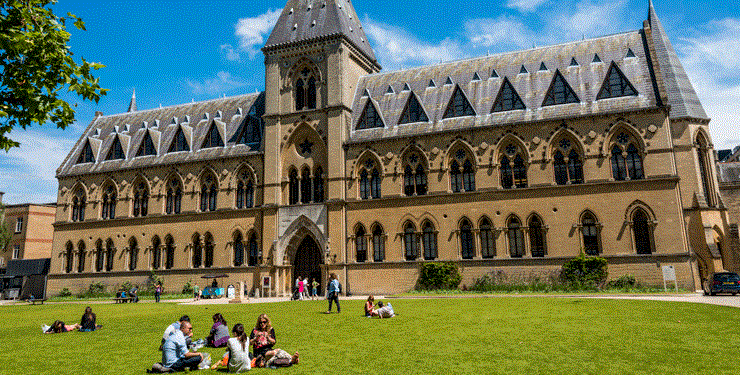 Oxford Universityhttps://www.oxforduniversityimages.com/At Oxford University, a young man, uneasy and unguided, sits by his windowsill as the last remnants of daylight fade below the horizon. Standing suddenly, he brushes his troubles away for a later time. Still, his head teems with visions of a grander future; he dreams not for himself, but for humanity. Planets orbit stars in faraway galaxies, hidden in the far recesses of his mind. In his head, the mysteries of the cosmos beckon to him. One day soon, the world will know him as the renowned theoretical physicist and mathematician, Stephen Hawking. Someone worthy of recognition, with a legacy that endures throughout history, must embody the ideals of his time. He provides inspiration to everyone, regardless of personal background or belief. During tumultuous times, he remains steadfast in his principles and strives towards goals greater than himself. The promise of heroism exists within every individual, but it is the innate duty of this individual to recognize and cultivate his potential. It can be found in the man who walks where others fear to tread, or in the researcher who works relentlessly to expand humanity’s knowledge of medicine. No matter the number of people affected, someone is considered heroic if he disregards his own desires in the hopes of impacting society in any small or significant way. A person fit to carry the title of a hero strives to better the world rather than focusing on himself as an individual. In turn, he inspires others to realize the depths of their true potential.
Oxford Universityhttps://www.oxforduniversityimages.com/At Oxford University, a young man, uneasy and unguided, sits by his windowsill as the last remnants of daylight fade below the horizon. Standing suddenly, he brushes his troubles away for a later time. Still, his head teems with visions of a grander future; he dreams not for himself, but for humanity. Planets orbit stars in faraway galaxies, hidden in the far recesses of his mind. In his head, the mysteries of the cosmos beckon to him. One day soon, the world will know him as the renowned theoretical physicist and mathematician, Stephen Hawking. Someone worthy of recognition, with a legacy that endures throughout history, must embody the ideals of his time. He provides inspiration to everyone, regardless of personal background or belief. During tumultuous times, he remains steadfast in his principles and strives towards goals greater than himself. The promise of heroism exists within every individual, but it is the innate duty of this individual to recognize and cultivate his potential. It can be found in the man who walks where others fear to tread, or in the researcher who works relentlessly to expand humanity’s knowledge of medicine. No matter the number of people affected, someone is considered heroic if he disregards his own desires in the hopes of impacting society in any small or significant way. A person fit to carry the title of a hero strives to better the world rather than focusing on himself as an individual. In turn, he inspires others to realize the depths of their true potential.
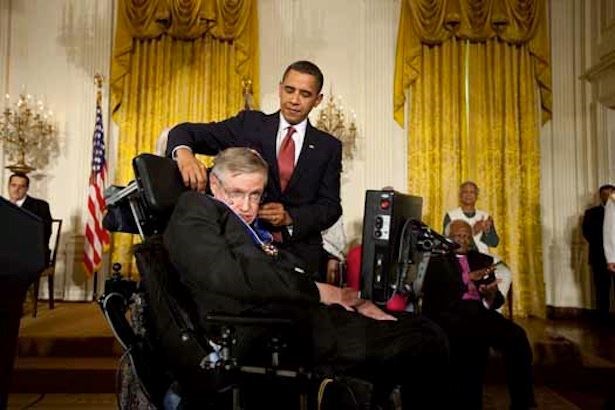 Hawking receiving the Medal of Freedom in 2009https://www.theatlantic.com/technology/archive/2013/01/when-stephen-hawking-went-to-the-white-house/266973/Someone worthy of this title is Stephen Hawking, a scientist celebrated for his outstanding brilliance in the fields of physics and cosmology. Born on January 8th, 1942, Stephen Hawking grew up in London as the eldest of four siblings. At the age of eleven, Hawking attended St. Alban’s School, where he earned the reputation of a mediocre student. While his father urged Hawking to pursue medicine, Hawking’s curiosity regarding the universe spurred him to pursue a degree in natural science at University College, Oxford. Restless and lacking purpose in life, Hawking did little work despite his obvious intelligence. When he was diagnosed with ALS at the age of twenty-one and given a life expectancy of two years, Hawking pushed himself to finish his PhD in physics and immersed himself into his research. He eventually earned the position of Lucasian Professor of Mathematics at Cambridge University, a title which he held for over thirty years. Over several decades, Hawking investigated the most fundamental workings of the universe, such as if the universe truly had a beginning. He sought to develop a “theory of everything”, which would effectively link all of the physical aspects of the universe into a single explanation of every natural law in existence. After endless research, Hawking concluded that black holes emit radiation around the edges, thereby proving that black holes are not completely black. He received countless awards for his work, including the Albert Einstein Award in 1978, one of the most distinguished awards in physics. By sharing his knowledge with the world through novels and lectures, coupled with an unwavering enthusiasm to share the most recent findings of physics with others, Hawking inspired many and gained international prestige. An admirable figure must possess the drive to alter humanity inextricably and possess the courage to execute what is right, especially if it is difficult. They are not the most noble or moral, but they sacrifice anything for the greater good. Stephen Hawking’s intellectual ambition allowed him to make great contributions to the scientific world, while his courageous spirit fortified him with the strength to propel the capabilities of his mind to great heights; therefore, Stephen Hawking possesses the true qualities of a hero worthy of universal admiration.
Hawking receiving the Medal of Freedom in 2009https://www.theatlantic.com/technology/archive/2013/01/when-stephen-hawking-went-to-the-white-house/266973/Someone worthy of this title is Stephen Hawking, a scientist celebrated for his outstanding brilliance in the fields of physics and cosmology. Born on January 8th, 1942, Stephen Hawking grew up in London as the eldest of four siblings. At the age of eleven, Hawking attended St. Alban’s School, where he earned the reputation of a mediocre student. While his father urged Hawking to pursue medicine, Hawking’s curiosity regarding the universe spurred him to pursue a degree in natural science at University College, Oxford. Restless and lacking purpose in life, Hawking did little work despite his obvious intelligence. When he was diagnosed with ALS at the age of twenty-one and given a life expectancy of two years, Hawking pushed himself to finish his PhD in physics and immersed himself into his research. He eventually earned the position of Lucasian Professor of Mathematics at Cambridge University, a title which he held for over thirty years. Over several decades, Hawking investigated the most fundamental workings of the universe, such as if the universe truly had a beginning. He sought to develop a “theory of everything”, which would effectively link all of the physical aspects of the universe into a single explanation of every natural law in existence. After endless research, Hawking concluded that black holes emit radiation around the edges, thereby proving that black holes are not completely black. He received countless awards for his work, including the Albert Einstein Award in 1978, one of the most distinguished awards in physics. By sharing his knowledge with the world through novels and lectures, coupled with an unwavering enthusiasm to share the most recent findings of physics with others, Hawking inspired many and gained international prestige. An admirable figure must possess the drive to alter humanity inextricably and possess the courage to execute what is right, especially if it is difficult. They are not the most noble or moral, but they sacrifice anything for the greater good. Stephen Hawking’s intellectual ambition allowed him to make great contributions to the scientific world, while his courageous spirit fortified him with the strength to propel the capabilities of his mind to great heights; therefore, Stephen Hawking possesses the true qualities of a hero worthy of universal admiration.
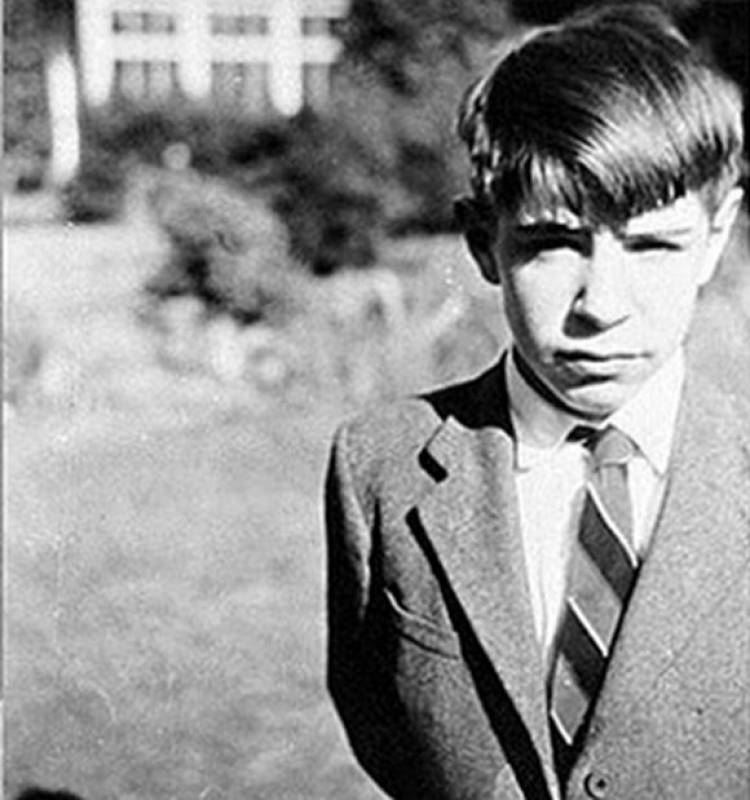 Stephen Hawking as a young manhttps://www.goalcast.com/2018/01/12/stephen-hawkings-life-story/
Stephen Hawking as a young manhttps://www.goalcast.com/2018/01/12/stephen-hawkings-life-story/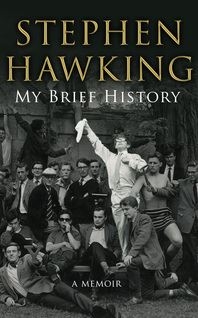 Hawking's autobiographyhttps://www.hawking.org.uk/my-brief-history.htmlDue to his ability to excel at the impossible and strive towards goals larger than himself, Stephen Hawking’s ambitious nature will immortalize his legacy in history. From a young age, Hawking questioned the world around him and dreamed of goals to expand the scope of human knowledge, which eventually led him to pursue a “theory of everything”, the answer to physics’ most elusive problem: “Chemistry was much more fun because unexpected things, such as explosions, kept happening. But physics and astronomy offered the hope of understanding where we came from and why we are here. I wanted to fathom the universe” (Hawking, My Brief History 19). Because no one had ever come close to fully understanding the universe before, Hawking’s goal seemed impossible. However, to be heroic is to transcend the impossible, and heroes dominate the impossible by taking risks others would fear to take. Even when some would fear the risk of failing at such an unfathomable task, Stephen Hawking devoted himself to his mission of understanding the universe, as demonstrated by his decision at a young age to pursue a career in physics when other fields would have been more enjoyable. Although he did not succeed entirely, Hawking nonetheless lit the flame that would continue to burn for decades, and perhaps centuries, as others too accepted the challenge. If not for his insatiable drive to contribute to humanity’s understanding of the universe, Hawking would not have made scientific history, for because Hawking set his mind to achieving this goal, he pushed the limits of human capability and therefore advanced humanity as a united people, earning him the title of a hero.
Hawking's autobiographyhttps://www.hawking.org.uk/my-brief-history.htmlDue to his ability to excel at the impossible and strive towards goals larger than himself, Stephen Hawking’s ambitious nature will immortalize his legacy in history. From a young age, Hawking questioned the world around him and dreamed of goals to expand the scope of human knowledge, which eventually led him to pursue a “theory of everything”, the answer to physics’ most elusive problem: “Chemistry was much more fun because unexpected things, such as explosions, kept happening. But physics and astronomy offered the hope of understanding where we came from and why we are here. I wanted to fathom the universe” (Hawking, My Brief History 19). Because no one had ever come close to fully understanding the universe before, Hawking’s goal seemed impossible. However, to be heroic is to transcend the impossible, and heroes dominate the impossible by taking risks others would fear to take. Even when some would fear the risk of failing at such an unfathomable task, Stephen Hawking devoted himself to his mission of understanding the universe, as demonstrated by his decision at a young age to pursue a career in physics when other fields would have been more enjoyable. Although he did not succeed entirely, Hawking nonetheless lit the flame that would continue to burn for decades, and perhaps centuries, as others too accepted the challenge. If not for his insatiable drive to contribute to humanity’s understanding of the universe, Hawking would not have made scientific history, for because Hawking set his mind to achieving this goal, he pushed the limits of human capability and therefore advanced humanity as a united people, earning him the title of a hero.
Not only did Stephen Hawking pursue the seemingly unfathomable, but he also worked to spread his knowledge with others at a global scale. When working tirelessly on his novel A Brief History of Time, Hawking constantly communicated with his publishing company to ensure that the novel would be easy to understand and accessible to everyone, ordinary people and science fanatics alike: “In this way, I hoped that most people would be able to share the excitement and feeling of achievement in the remarkable progress that has been made in physics in the last fifty years”( Hawking, My Brief History 54). Hawking could have easily utilized his genius in order to obtain glory and fame among the most intelligent in his field. However, a true hero is motivated by the betterment of others rather than himself, and Hawking wished to share his knowledge with everyone, regardless of intelligence. When writing his novel, Hawking challenged himself to complete yet another daunting task, which was to make decades of scientific information common knowledge with the intent of answering the most long sought after questions in life: where do we come from and why do we exist? Had Hawking never stopped at nothing to sensationalize science once more, a new generation of scientists would not have discovered their true aptitude for science. Hawking possessed the drive to chase after formidable visions, but above all else, his true purpose laid in serving others, as exemplified by both his ability make his dreams a reality and his goals in expanding human knowledge; therefore, Stephen Hawking will be remembered as a hero.
Due to Stephen Hawking’s courageous ability to prove the world wrong and make mistakes in the pursuit of knowledge, Stephen Hawking remains worthy of global recognition. After Hawking contracted ALS, he eventually lost the use of his body with the exception of select movement in his hands, as his colleague Kip Thorne described:
As he gradually lost the use of his hands, he started carefully choosing research projects that could be tackled and solved through geometrical arguments that he could do pictorially in his head, and he developed a powerful set of tools that no one else had, so in one sense when you lose one set of tools, you may develop other tools. . . and if you're the only master in the world of these other tools, that means certain types of problems you can solve and nobody else can. (A Brief History of Time 00:43:19-58)
Hawking’s loss of dexterity forced him to solve problems in more creative ways and to explore the expanse of the universe using only his head. To prove that Hawking was admirable because he learned to persevere through complications relating to his health would be a disservice to both Hawking’s ambition and intelligence. The world needs heroes to admire and look up to in times of need; therefore, Hawking was not a hero because he continued to research in spite of his illness, but rather because he possessed the courage to demonstrate to the world that disability has nothing to do with the limitations of the mind. Furthermore, Hawking deserves the title of a hero because he possessed the courage to be wrong. Throughout his life, Hawking made several bets, the most noteworthy of which being a bet he made with Kip Thorne and John Preskill entailing that black holes are incapable of losing information:
Dr. Stephen W. Hawking of Cambridge University in England -- the brilliant theorist regarded as one of Albert Einstein's intellectual successors -- has conceded defeat in a famous bet he made six years ago on a matter of cosmic significance. The bet he made with two professors at the California Institute of Technology was that naked singularities could not exist, and now, it seems, they could -- maybe. (Browne)
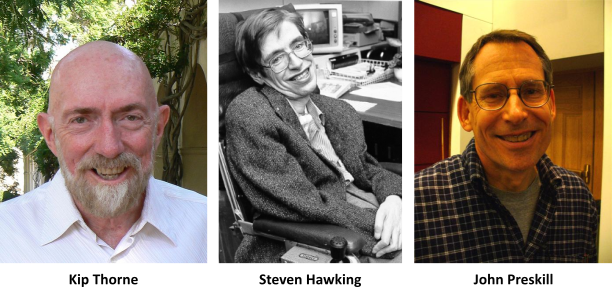 Kip Thorne, Stephen Hawking, and John Preskillhttps://www.quantum-bits.org/?p=1134Hawking was willing to admit that he was wrong, even several years after making this bet. If a hero must embody the ideals of his time, Hawking embodied the ideal that to make a mistake is not a flaw, but rather a strength when able to be recognized and utilized for further learning. At this time, society already established Hawking as a brilliant scientist. Thus, his ability to choose the difficult path in realizing his mistakes along the journey to human enlightenment will place his name beside legends like Galileo and Einstein himself.
Kip Thorne, Stephen Hawking, and John Preskillhttps://www.quantum-bits.org/?p=1134Hawking was willing to admit that he was wrong, even several years after making this bet. If a hero must embody the ideals of his time, Hawking embodied the ideal that to make a mistake is not a flaw, but rather a strength when able to be recognized and utilized for further learning. At this time, society already established Hawking as a brilliant scientist. Thus, his ability to choose the difficult path in realizing his mistakes along the journey to human enlightenment will place his name beside legends like Galileo and Einstein himself.
Because Hawking exceeded the impossible in his pursuit of knowledge and maintained an unbreakable spirit through his tenacity to surmount both the boundaries of science and the human mind, Stephen Hawking forever resides beside history’s greatest luminaries. Throughout decades of research, Stephen Hawking stopped at nothing to expand humanity’s knowledge of the universe:
Stephen Hawkinghttps://www.nation.co.ke/news/world/Top-Stephen-Hawking-quotes/1068-4341642-jpn4tuz/index.html. . . if we do discover a complete theory, it should in time be understandable in broad principle by everyone, not just a few scientists. Then we shall all, philosophers, scientists, and just ordinary people, be able to take part in the discussion of the question of why it is that we and the universe exist. If we find the answer to that, it would be the ultimate triumph of human reason -- for then we would know the mind of God. (Hawking, A Brief History 193)
Hawking exemplified that the boundaries of the mind are limitless when one devotes himself to improving the world, intent on achieving a purpose greater than himself. With his quick wit and passion for life’s most vexing puzzles, Hawking became a beacon of scientific achievement because of his avid quest for enlightenment. He is now gone; however, as I pursue a scientific career with the same passion he once did, I know his legacy will never die. As I examine the lives of people such as Stephen Hawking, I find it easy to discourage myself by surmising that I am not intelligent or capable enough to alter the world that I live in. Yet, when I consider the full and fruitful life of Stephen Hawking, I remember that greatness is not achieved through the ability to solve intricate equations, but rather through the ability to dream beyond the ordinary. This invaluable skill, as Hawking taught me, is the true definition of brilliance. In the grand scheme of time and space, the names of heroes and legends may fade, but the actions of the extraordinary are never forgotten.
Page created on 5/30/2018 1:20:02 AM
Last edited 5/31/2018 11:00:03 PM
